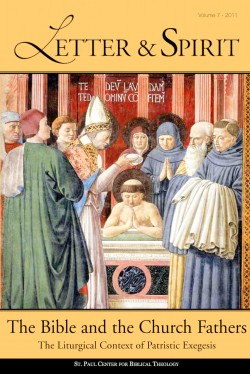
If you’ve read any of my books, you know about the biblical significance of the number seven. God created the world in six days and rested on the seventh. The seventh day would forever stand as a sign of the covenant (see Exodus 31:16-17). He invited mankind to enter into His rest—to enter into a covenant relationship with Him, a family relation. Indeed, to swear a covenant in ancient Israel was to “seven oneself.”
I cannot help but notice, and be pleased, that I am announcing the appearance of the seventh issue of our journal of biblical theology, Letter and Spirit, during the seventh month of the year. Also during this month, at our Applied Biblical Studies conference, we will launch our newest Journey Through Scripture program.
Both the journal and the Bible study share a common focus: the Fathers of the Church. These projects represent part of our (overjoyed) response to Pope Benedict’s challenge in his 2010 Apostolic Exhortation Verbum Domini. There he called for a “renewed attention to the Fathers of the Church and their exegetical approach.”
Why does he say that? He goes on to explain that the “Church Fathers present a theology that still has great value today because at its heart is the study of sacred Scripture as a whole. Indeed, the Fathers are primarily and essentially commentators on sacred Scripture.” The emphases are mine, because the phrases explain the emphasis in our programs this year.
According to the pope, the Fathers’ example can teach modern biblical interpreters “a truly religious approach to sacred Scripture, and likewise an interpretation that is constantly attuned to the criterion of communion with the experience of the Church, which journeys through history under the guidance of the Holy Spirit.”
Acknowledging that the current situation is less than “adequate,” Pope Benedict is urging us all to summon the Fathers to make “a significant contribution to the recovery” of Scripture studies.
And we’re simply doing as he said. We’re drafting the Fathers into action to teach us as they taught their long-ago congregations. We want them to teach us anew how to read the Bible, hear the Bible, study the Bible, interpret the Bible, preach the Bible, and (most importantly) live the Bible. From our academic journal to our parish-based Scripture-study program, we’re invoking Augustine, Clement, Athanasius, Irenaeus, Jerome, Basil, Ambrose, a couple of Cyrils and a boatload of Gregorys. We want them, like good fathers, to father us—to come to our assistance and make haste to help us. We want to read the Scriptures with eyes trained by history’s greatest spiritual masters.
We are, at last, able to see the Center working the way we always hoped it would work. The labors of scholars — in our “Letter and Spirit” programs — are bearing fruit for parishes and parishioners through our “Breaking the Bread” programs.
Through our “Breaking the Bread” programs we promote biblical literacy for all Catholics. Through our “Letter and Spirit” programs we promote biblical fluency for clergy and teachers. The rising tide lifts all boats — and gives a great lift to the Barque of Peter.
The whole Church benefits. We can hear the difference in the preaching of priests and deacons who come to our events. We pick it up from them in the confessional, too. The clergy notice it when they encounter appreciative parishioners — men and women who have attended our seminars, pilgrimages, and Bible studies.
And none of this good work could happen without your prayers, encouragement, and contributions. Though it’s too early for us to rest, we are glimpsing the abiding joy of the biblical seventh day. We can see our dreams from a decade ago beginning to be fulfilled — again, thanks to you.
I invite you to rejoice with us and with the Fathers this seventh month. And I beg your continued prayers.